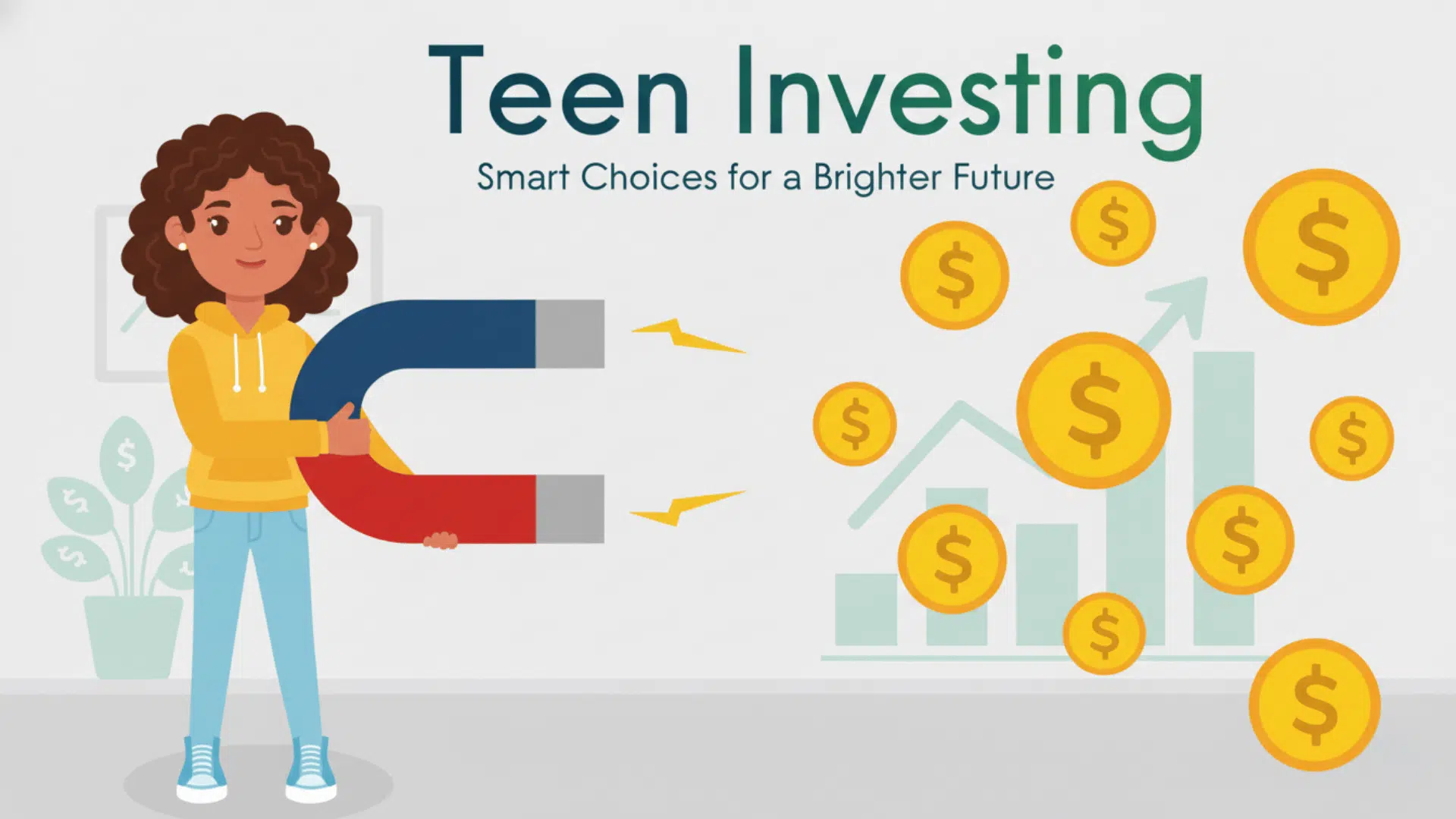Wondering how old you have to be to invest? I used to think you had to wait until adulthood to start, but that’s not exactly true.
While most brokerage firms require you to be 18 to open your own account, there are smart ways for teens and even younger kids to start investing early with adult help.
From custodial accounts to beginner-friendly investing apps, numerous safe options are available for teens.
In this guide, I will walk you through the age requirements, the best ways for minors to invest, and helpful resources for young investors who want to start building wealth early.
What is the Minimum Age to Invest in Stocks?
So, how old do you have to be to invest in stocks? In most parts of the U.S., you need to be 18 years old to open an investment or brokerage account in your own name.
That’s because 18 is the legal “age of majority,” meaning you can sign binding contracts and take financial responsibility. However, in a few states, this age is 21, so it’s always smart to check your state’s specific rules.
Age matters because investing involves legal agreements, you’re buying ownership in companies, and managing real money.
Most major brokerage firms, such as Fidelity, Charles Schwab, and E*TRADE, follow these legal guidelines.
However, if you’re under 18, don’t worry, there are still ways to start investing early with an adult’s help.
Why Teens Should Start Investing Early?


Learning about investing as a teen isn’t just about making money; it’s about building smart habits for life. Starting young gives you time to grow your knowledge and your money. Here’s why it matters:
| Reasons | Why It Matters |
|---|---|
| The Power of Compound Interest | Starting early lets your money grow longer, turning small investments into bigger returns through compounding. |
| Building Real-World Financial Skills | Investing teaches budgeting, goal setting, and smart decision-making for real-life money situations. |
| Avoiding Costly Financial Mistakes | Learning early helps you spot scams, avoid debt, and make better financial choices. |
| Developing Discipline and Long-Term Thinking | Investing fosters patience, consistency, and responsibility, laying the groundwork for future financial success. |
Overall, the earlier you learn about investing, the better you’ll understand how money works, and the more confident you’ll be managing it throughout your life.
Investing Options for Minors and Teens
Even though you’re not old enough to invest solo, there are several smart ways to start learning and growing your money with adult supervision.
- Custodial Accounts (UGMA/UTMA): These accounts let an adult manage investments for you until you reach 18 or 21, giving you a strong financial head start.
- Teen Brokerage Accounts (like Fidelity Youth): Designed for individuals aged 13–17, these accounts enable supervised investing, helping teens develop smart financial habits and gain real market experience early.
- Custodial Roth IRA: Perfect for teens with part-time jobs, parents manage the account, but the money grows tax-free for your future or retirement goals.
- 529 College Savings Plan: A great way to invest in education. Funds can grow tax-free and be used later for qualified college expenses or tuition costs.
- Family Investing Apps: Platforms like Greenlight or Acorns Early allow families to invest together, teaching kids how saving and investing can turn small amounts into significant rewards.
Starting early gives you time to learn, grow, and benefit from the power of compounding. With your parents’ help, you can build smart investing habits that last a lifetime.
How Teens Can Legally Invest In Stocks: Step-by-Step Guide


Investing as a teen may sound complicated, but it’s completely possible and legal when done the right way. Follow these simple steps to start your investing journey safely and confidently.
Step 1: Find an Adult Sponsor or Guardian
The first step to investing as a teen is finding an adult, usually a parent or guardian, who’s willing to help manage your account.
They’ll be legally responsible until you reach adulthood, guiding you through account setup, funding, and decision-making. Having an experienced adult partner ensures your early investing journey is both safe and educational.
Step 2: Open a Custodial Account or Teen-Specific Platform
Once you’ve got an adult to help, open a custodial account (UGMA/UTMA) or a youth account. Platforms like Fidelity allow you to invest under adult supervision while learning hands-on.
Your adult co-owner will manage approvals and oversee transactions, helping you understand the process responsibly as your savings start to grow.
Step 3: Learn Stock Market Basics and Investing Terminology
Before you start buying anything, take time to learn the basics, terms like stocks, ETFs, dividends, and compound interest.
Many free online resources, videos, and teen-friendly investing apps explain these in simple ways. Understanding how the stock market works will help you make smarter choices and avoid common beginner mistakes.
Step 4: Research and Decide on Stocks or ETFs
Research companies or exchange-traded funds (ETFs) that interest you. Look at performance history, long-term growth, and stability.
Teens can start with well-known companies or beginner-friendly ETFs for diversification. With adult guidance, you’ll learn how to evaluate options, understand risks, and make confident decisions about where your money goes.
Step 5: Manage Investments Together Until Legal Age
Keep track of your investments regularly with your adult sponsor. Review progress, learn about market trends, and discuss new opportunities.
This shared experience builds teamwork, patience, and a better understanding of financial growth. You’ll see firsthand how consistent investing, even with small amounts, can lead to long-term rewards.
Step 6: Transfer Account Control Once Reaching Majority Age
When you turn 18 (or 21 in some states), the custodial account legally becomes yours. At that point, you’ll gain full control of your investments.
This transition marks an exciting milestone; you’ll manage decisions, deposits, and withdrawals independently, armed with the experience and financial confidence you’ve built over the years.
Tax Rules and Legal Considerations for Teen Investors


Before you start investing, it’s important to understand a few key rules. These can affect how much tax you pay, your college financial aid, and how you manage risk. Here’s what every teen investor should know:
- Kiddie Tax: If your investment income exceeds $2,500, it may be taxed at your parents’ higher tax rate instead of your own.
- Financial Aid: Money in custodial accounts counts as your asset on FAFSA, which can reduce the amount of financial aid you qualify for.
- Risk Management: Stock prices fluctuate, so starting with index funds or ETFs helps spread risk across many investments.
Watch Out! Beginner Investing Mistakes to Avoid
Even the smartest young investors can stumble when they’re just getting started. Here are the most common mistakes to watch out for, and how to steer clear of them.
| Mistake | Why It’s a Problem | What to Do Instead |
|---|---|---|
| Chasing “hot” stocks or quick profits | High risk of losing money when trends reverse quickly | Focus on long-term growth with steady, reliable investments |
| Ignoring diversification | Putting all money in one stock increases risk | Use ETFs or index funds to spread money across many companies |
| Forgetting taxes or account restrictions | Can lead to surprise tax bills or withdrawal penalties | Understand account rules and track taxable income annually |
| Impulse trading without adult review | Emotional decisions often lead to poor investment choices | Discuss trades with parents or guardians before making moves |
Investing Resources for Teens
Learning to invest is easier (and more fun) when you have the right tools. These beginner-friendly resources help teens and parents learn together while building smart money habits.
1. Best Investing Apps for Teens


Many apps now offer teen-specific features that make learning about money a safe and interactive experience.
- Greenlight Invest: Let’s parents oversee spending, saving, and investing all in one place.
- Acorns Early: Helps families start investing spare change for kids’ future goals.
2. YouTube Channels & Educational Videos


Free, engaging videos can make investing concepts easy to grasp.
- Graham Stephan: Explains investing basics and saving tips in a relatable way.
- The Plain Bagel: Offers simple breakdowns of how the stock market works.
3. Recommended Books & Courses


Books and online classes help teens and parents learn together at their own pace.
Books:
- Teenvestor, by Emmanuel Modu & Andrea Walker, is a classic introduction for young investors.
- I Want More Pizza by Steve Burkholder explains investing and money in a language teens can understand.
4. Online Courses


Learn investing tips with trusted online programs.
- Khan Academy: Personal Finance – Free and beginner-friendly.
- Coursera: Financial Markets – A structured introduction to stocks, ETFs, and risk management.
These resources make investing approachable for teens, helping them (and parents) build confidence, understand risk, and start their financial path the smart way.
How Parents Can Help Teens Start Investing?
Parents play a key role in helping teens begin their investment journey. They can open custodial accounts like UGMA, UTMA, or custodial Roth IRAs on behalf of their children.
Beyond just setting up accounts, parents should teach basic financial concepts like compound interest, risk, and diversification.
Reviewing trades together, discussing investment choices, and encouraging consistent contributions help teens build confidence and good habits.
This partnership not only gives teens a head start on wealth-building but also strengthens their financial literacy for life.
At the End
Starting to invest as a teen isn’t just about making money; it’s about learning how to manage it wisely.
I believe the earlier you start, the easier it becomes to understand risk, patience, and long-term planning.
With a little help from parents or guardians, you can build habits that last a lifetime. Even if it’s through apps, courses, or small investments, each step you take now can shape your financial future.
Remember, it’s not about getting rich overnight; it’s about growing smarter with every decision.
The knowledge and discipline you gain today will guide every financial choice you make tomorrow. Keep learning, stay consistent, and let time work its magic on your investments.
What do you think, is it better to start early or wait until you’re older? Share your thoughts in the comments below!

